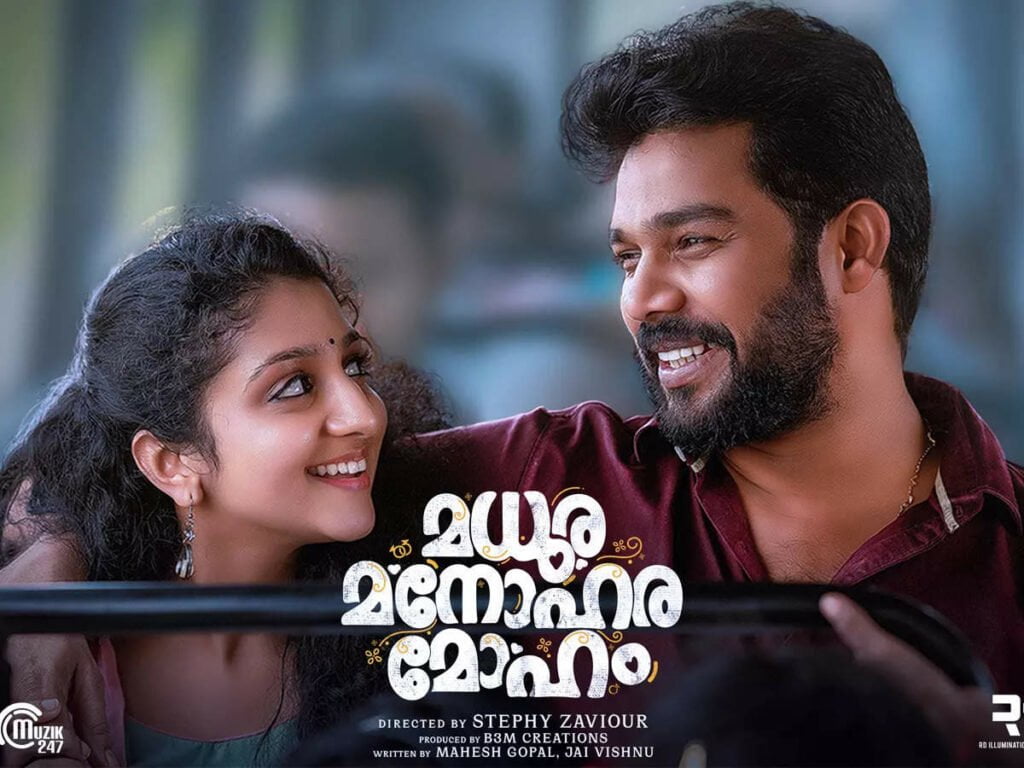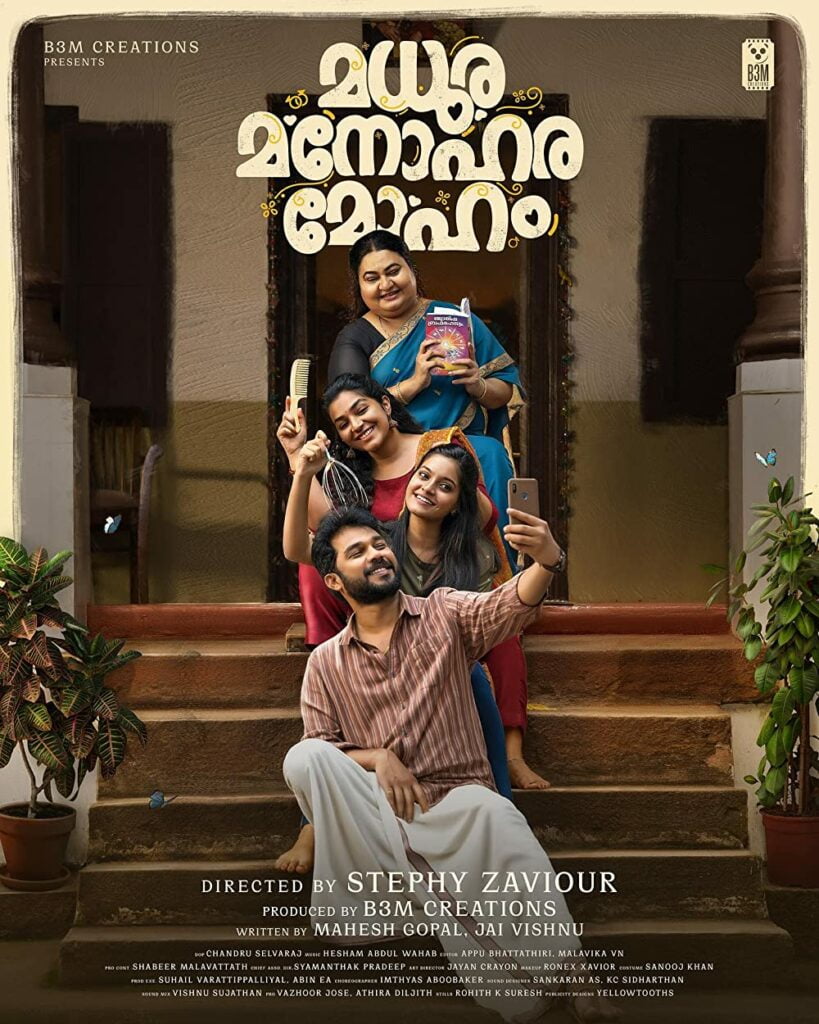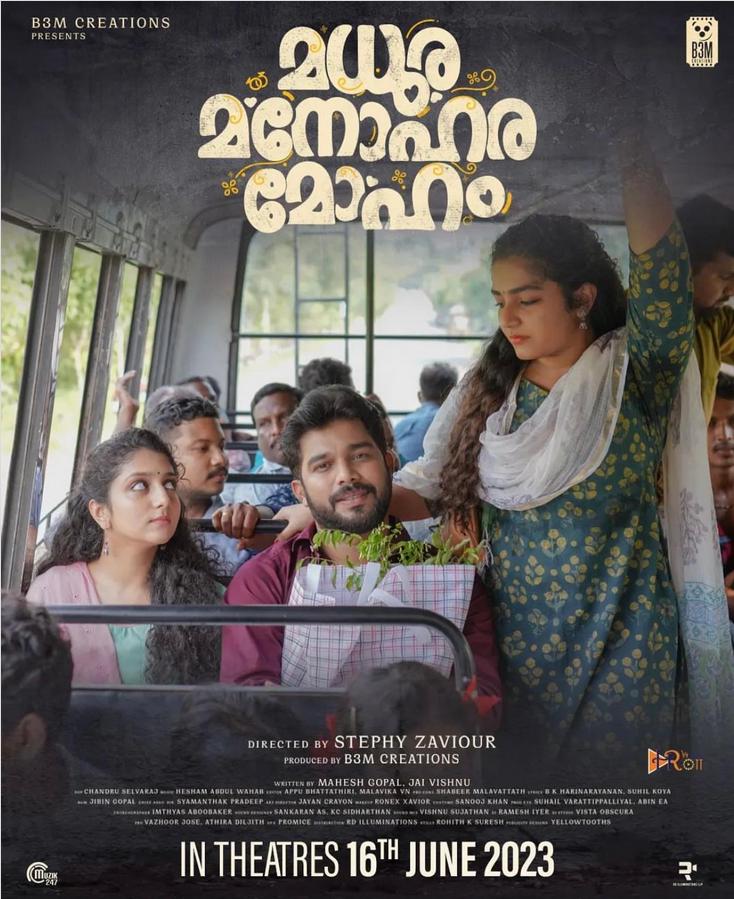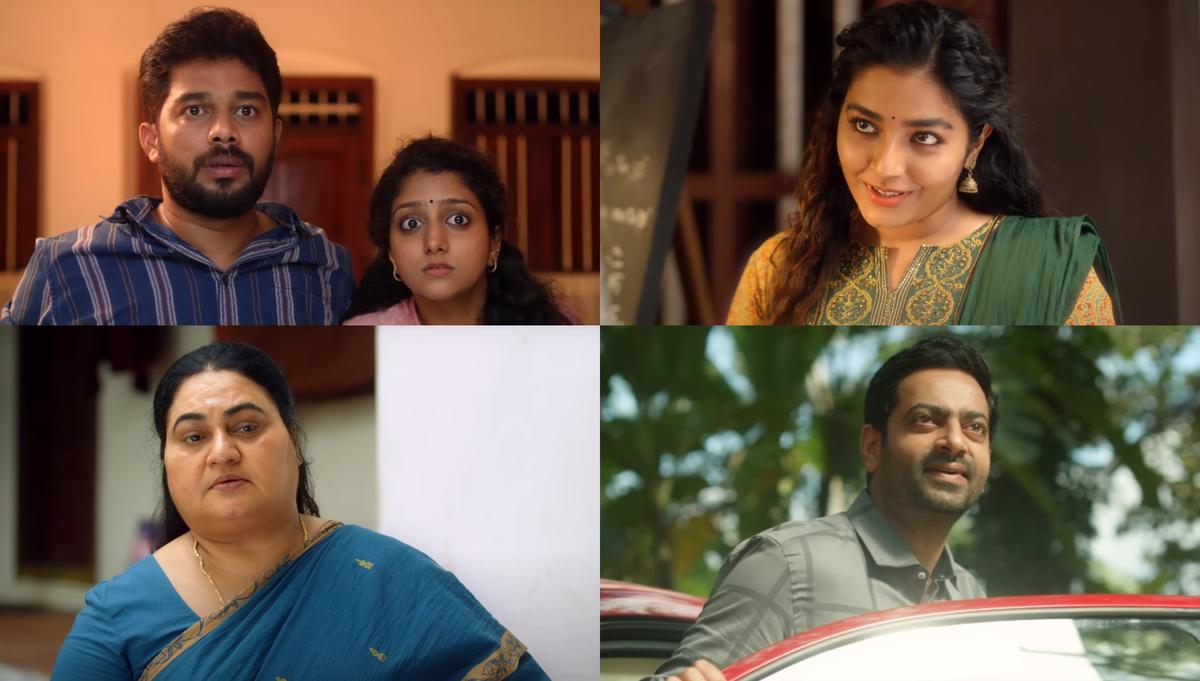The Malayalam movie Madhura Manohara Moham (2023) recently released in theatres is a light family entertainer infused with many diverse elements. It is the directorial debut of Stephy Xavier that continues to draw much attention from viewers, more than from critics owing to easy identification with the characters and their circumstances. It deals with the typical everyday story of a common Kerala household with three siblings: Meera, Manu, Malu and their mother, Ushamma.
Caste in Kerala households
Unlike many other societies, the modern Kerala society never leaves out a chance to poke fun at the old generation and even at the younger generation who tries to practice their caste pride. There are many instances spread throughout the movie, like Ushamma’s need to keep cows even on loan just to hold the story of their rich family ancestry. Though it takes much labour for the family to look after the cows, Ushamma does it happily. Another poignant instance is Ushamma’s conversations with the fisherwoman where the latter shares hot rumours about love jihad and inter-religious marriages. It clearly makes one understand the ignorance and mis-notion surrounding love jihad.

Surprisingly, Ushamma receives the fisherwoman but is not treated any better as well. She replaces the glass tumbler with a steel tumbler before serving tea to the fisherwoman. It projects the notions of untouchability and casteism still living in Ushamma in modern Kerala. And like most of the mothers, Ushamma is taken aback on hearing about the love affair of Meera with a Christian boy and this same mother questions Malu regarding the caste of her boyfriend, approving it when she learns that he is an upper caste. Another notable punch from Ushamma is when she mentions ‘a bus overturned in the north killing two cows’ and her concern for the cows is unforgettable for the viewers.
Though Ushamma is an indoctrinated caste-bound mother, her eldest son Manu is not so. Manu understands that he needs to hold on to caste at times for attaining his goals or he is ready for causal double standards. For instance, when he joins their upper caste community organisation in order to impress Indrasenan, its president and his future father-in-law. Thus, Manu also tries to prevent an inter-caste marriage so as to please Indrasenan.
Though Ushamma is an indoctrinated caste-bound mother, her eldest son Manu is not so. Manu understands that he needs to hold on to caste at times for attaining his goals or he is ready for causal double standards. For instance, when he joins their upper caste community organisation in order to impress Indrasenan, its president and his future father-in-law. Thus, Manu also tries to prevent an inter-caste marriage so as to please Indrasenan. But, on learning about the love affair of Meera with a Christian man, he does not discriminate and readily agrees but only after ensuring the man’s intentions are pure.
Indrasenan, the president of the upper caste community organisation becomes a direct representation of the many people who hold such offices, growing in power by promoting discriminative acts. He is as much concerned about caste as it can impact his position and status in society. He considers inter-caste marriages as an insult to their community endangering their purity and future populations. He never tries to understand the reason why his daughter loves Manu as an individual and lives in his immediate complacency. Therefore, throughout Indrasenan remains a flat character in a stereotypical manner.
Women in ‘Madhura Manohara Moham’
Malu is the one character who stands ahead of the others in terms of modernity. Though she cleverly understands the expectations meted out to her from her house and community, she strongly stands for what she believes is right. Therefore, she boldly speaks about her relationship, goes out with her boyfriend and defies the curfew times at home. These stand in direct contrast to her elder sister Meera who cunningly keeps all her relationships a secret.

Meera also exhibits modern elements in that she knows there is no untouchability when she serves the fisherwoman tea in the glass tumbler they use. The evil eye myth generated by Ushamma concerning their new neighbour is also cleanly brushed aside by Meera and moreover, she chooses to love or mingle with everyone irrespective of caste-religious differences, unlike her mother.
The reality of caste and matrimony sites
After learning about Meera’s relationship, the movie mockingly presents the only solution available before Manu is registering her name on the matrimony site. Here, before sorting out the matter with his sister in private, he takes over the matter himself. Manu considers it a serious issue that can spoil their family’s status and future. He is too caught up in his mental conflicts that he does not realise what is the future for Meera in her married life. This ends up in Meera’s commodification in the hands of her family and future husband alike.
After learning about Meera’s relationship, the movie mockingly presents the only solution available before Manu is registering her name on the matrimony site. Here, before sorting out the matter with his sister in private, he takes over the matter himself. Manu considers it a serious issue that can spoil their family’s status and future.
It mindfully presents the reality associated with such arranged marriages where wealth, caste and family status matter over everything else. The character Jeevan Raj is assumed by Meera’s family as her happy ending after her careless liaisons. Both of them are very typical examples of what to expect from a business site hunting after customers mated based on their criteria of compatibility. It is an ironic representation of marriage based on calculations that are common in society.
Patriarchy overridden by matriarchy
A fairly notable strain throughout the movie is the capacity of females to determine their future. Initially, Ushamma as a single mother takes her family forward through all the struggles and then Meera though younger than Manu, shoulders some of the family responsibilities. Moreover, she could establish herself as a financially independent post-graduate student, deciding most of the matters at home. Thus, she emerges as an empowered woman in the movie where she is respected and trusted by the entire family. Malu, though the youngest is also bold to openly present her opinions and decisions before the family.
But the matriarchal voices in the house are nowhere spared from the demands of their caste pride, hence Manu assumes the role of a patriarch and executes the deemed future for his sister. Meera. Jose, the close colleague and associate of Manu, is a crucial representation, he becomes the logical voice of the viewers. He daringly questions the actions of Manu and its gender questions. The same freedom enjoyed by Manu owing to his male privilege is not assigned to Meera upon learning about her love affairs. It deliberates on the hypocritic nature of patriarchy, the males of the family will only provide as much a voice and rights to their women in that they don’t intrude on other spaces or remain supportive to them.
The warmth and affection of sibling bond
Though the movie portrays conflicting elements of relationships and male power, it also never fails to address the warmth in the familial space. Manu, Meera and Malu raised by their single mother Ushamma share a close connection among themselves. This often makes the viewers nostalgic about their childhood and sibling bonds. It helps one to analyze the quality of life around us raptured in the digital world.
Each of them could instantaneously understand the change in dispositions and therefore, the movie firmly brings out the type of communication one needs around. Though Meera has her personal life she keeps her check on both Malu and Manu alike. Similarly, Manu forgives and continues to love Meera, even after knowing about her personal life and he wants only the best for her future.

Though the movie is a complete entertainer, it has failed at times to address the whole issue surrounding caste and religion in the Kerala context. The movie at times relies on the audience’s reasoning to justify the acts of Manu as an element of a strictly bound society. Also, the bold character of Meera is seen muted in the second half of the movie and no justification is given for her actions.
Though all the characters of the siblings are educated and progressive they learn to exhibit double standards as a strategy for survival without which living is almost impossible. Their middle-class background and financial struggles also add to this, but the most important turn of the movie is that it has truly shown the real case of the familial space in Kerala.
About the author(s)
Vidhu (she/her) is an emerging writer with Masters in English language and literature, keen on learning the politics of the world around her. She has dreams to create a career in journalism and writing, where she unburdens her self. She has a great taste for movies from varies geographical spans and pens down poetry in magical charms. She is open to projects or research centring on humanities.






You’re so right!! It bothered me the casteism was never addressed also the way manu said like “she’ll do what i say i’ll make her” about her sis just like ughhh made me so uncomfortable